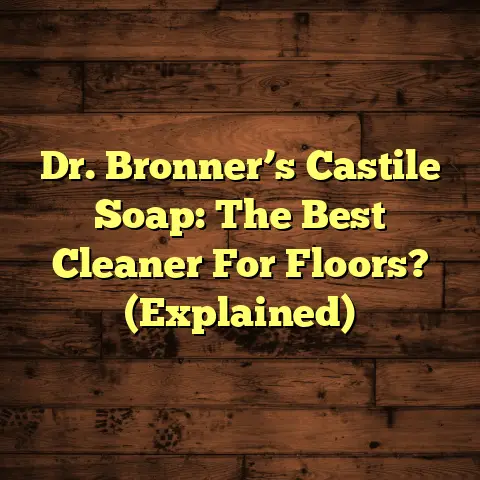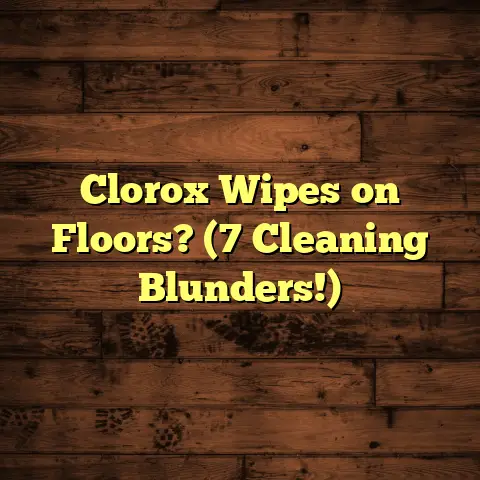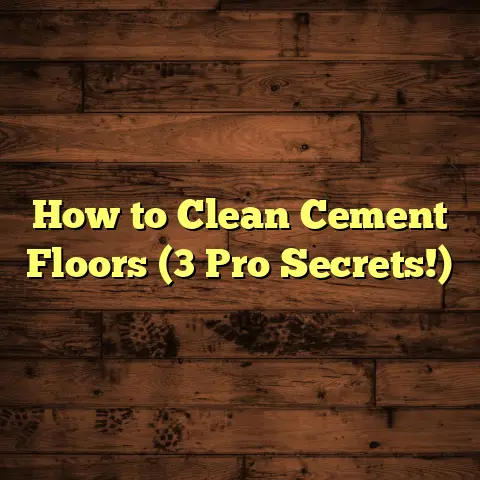How To Disinfect Floors Without Bleach? (Explained)
Many people assume that bleach is the go-to solution.
However, I’ve learned through experience that this isn’t always the best or safest option.
I remember my first time using bleach on a client’s beautiful hardwood floor—I was horrified when I noticed the discoloration.
That unforgettable moment taught me that there are better alternatives to disinfecting floors without risking damage or leaving harmful residues behind.
Understanding the Need for Disinfection
Disinfecting floors is crucial, especially in homes with children or pets, where germs and bacteria can thrive.
My clients often ask how to keep their floors clean and safe without using harsh chemicals.
I’ve experimented with various methods and products over the years, aiming for effective yet gentle solutions.
Why Avoid Bleach?
Bleach can be an effective disinfectant but comes with several downsides.
It has a strong odor, can irritate the skin and eyes, and poses risks to both pets and children.
Not to mention, it can damage certain flooring types.
So, let’s explore some practical alternatives that I’ve found work wonders.
Natural Disinfectants
Vinegar Solution
Vinegar has been my go-to for a long time.
It’s a natural disinfectant that’s safe for most floors.
Here’s how I use it:
- Mixing the Solution: I combine equal parts of water and white vinegar in a bucket.
- Mopping: Using a microfiber mop, I gently scrub the floor.
Vinegar’s acidity helps kill bacteria without harsh chemicals. - Drying: I ensure the floor dries quickly to prevent slipping.
I’ve found this method particularly effective for tile and laminate floors.
The vinegar smell dissipates quickly, leaving a clean scent behind.
Baking Soda Paste
For tougher stains or areas that need extra attention, baking soda comes into play.
- Creating the Paste: I mix baking soda with a little water to form a paste.
- Application: I apply it to stains or scuff marks and let it sit for about 10-15 minutes.
- Scrubbing: Using a soft cloth or sponge, I gently scrub the area and then rinse with clean water.
This method has saved me numerous times on stubborn spots.
Essential Oils for Disinfection
Essential oils like tea tree oil and lavender not only smell delightful but also have natural antibacterial properties.
- Mixing Oils: I add a few drops of essential oil to my vinegar solution.
- Cleaning: The result is a pleasant-smelling disinfectant that effectively cleans and refreshes the space.
My clients love the aroma, and it adds a personal touch to floor cleaning.
Commercial Products Without Bleach
Over the years, I’ve explored various commercial products specifically designed for floor disinfection without bleach.
Here are some of my favorites:
Hydrogen Peroxide Cleaners
Hydrogen peroxide is another powerful disinfectant that doesn’t come with bleach’s drawbacks.
- Application: I use it in a spray bottle, applying it directly to the floor.
- Contact Time: Allow it to sit for a few minutes to kill germs effectively before wiping it away.
I’ve found hydrogen peroxide particularly useful on vinyl and tile floors.
Plant-Based Cleaners
There are several plant-based cleaners on the market that are effective and safe for families.
Brands like Seventh Generation or Method have formulas free from bleach but still pack a punch against germs.
- Usage: I follow the instructions on the label, typically spraying and wiping with a soft cloth or mop.
- Effectiveness: The results are often impressive, leaving floors clean without any harsh chemical residue.
Tips for Maintaining Clean Floors
- Regular Sweeping or Vacuuming: Keeping dirt and debris off your floors will reduce the need for heavy cleaning later on.
- Promptly Clean Spills: Addressing spills quickly minimizes stains and odors.
- Use Rugs: Placing rugs in high-traffic areas helps protect your floors from scratches and wear.
Personal Experiences and Insights
In my journey as a flooring contractor, I’ve had my share of successes and challenges when it comes to floor cleaning.
For instance, during a recent project, I was tasked with cleaning old hardwood floors before refinishing them.
My client insisted on using bleach due to its perceived effectiveness.
After a detailed discussion about potential damage, we opted for a vinegar solution instead.
The results were fantastic—we preserved the wood’s natural beauty while ensuring it was sanitized.
Another challenge arose when tackling tile floors in a busy restaurant.
The grease buildup was daunting, but using a combination of baking soda paste and essential oils helped restore cleanliness without causing harm.
I’ve learned that every flooring type has its quirks, and understanding these nuances has become second nature to me over the years.
Cost Estimation with FloorTally
When handling flooring projects, cost estimation is vital to ensure transparency with clients.
FloorTally has been instrumental in this regard.
It provides accurate estimates based on local material prices and labor rates.
By inputting various flooring options and dimensions, I can present clients with realistic budget projections right from the start.
This not only helps manage expectations but also builds trust—something I value in my client relationships.
Disinfecting Different Types of Flooring
Hardwood Floors
Cleaning hardwood floors requires special attention to avoid damage.
- Avoid Excess Water: Using too much water can warp or damage the wood.
- Gentle Cleaning Solutions: Stick to pH-neutral cleaners or vinegar solutions to maintain the finish.
- Regular Maintenance: Dusting or sweeping daily helps prevent dirt buildup.
I often remind my clients about using felt pads under furniture to prevent scratches.
Tile Floors
Tile is generally more durable but still requires careful cleaning.
- Grout Care: Grout lines can trap dirt; using baking soda paste can help lift stains effectively.
- Avoid Acidic Cleaners: Some cleaning agents can damage the glaze on tiles.
- Sealants: Regularly applying sealants can prolong the life of your tile flooring and make cleaning easier.
In my experience, sealing grout lines has made a significant difference in maintaining tile floors in commercial spaces.
Vinyl Floors
Vinyl flooring is versatile and easy to maintain but still needs attention.
- Avoid Harsh Chemicals: Stick with mild detergents or vinegar solutions.
- Use Soft Mops: Microfiber mops work best without scratching the surface.
- Immediate Cleaning: Wipe up spills immediately to prevent staining.
During one project in a kitchen installation, we had to deal with some stubborn grease stains on vinyl flooring.
The baking soda paste worked wonders here!
Eco-Friendly Practices
As a flooring contractor, I’ve become increasingly aware of the environmental impact of cleaning products.
- Choose Biodegradable Products: Whenever possible, opt for cleaners made from natural ingredients.
- DIY Cleaning Solutions: Homemade cleaning solutions often reduce plastic waste associated with store-bought products.
- Educate Clients: I take time to inform my clients about eco-friendly practices for maintaining their floors, which they appreciate.
Challenges in Floor Disinfection
While many methods are effective, challenges can arise based on specific situations:
- Stains That Won’t Budge: Some stains may require professional intervention.
- Allergies Sensitivity: Not all clients respond well to natural scents; finding a balance is key.
- Time Constraints: Busy households may require quicker solutions without compromising cleanliness.
In one instance, I worked with a family who had severe allergies to certain scents; we had to find unscented cleaning solutions that still provided effective disinfection.
Future of Floor Cleaning Products
The market is evolving rapidly regarding floor cleaning products that prioritize safety and efficacy without harsh chemicals.
- Innovative Solutions: Companies are focusing on creating products that are as effective as traditional cleaners but without harmful side effects.
- Consumer Awareness: More homeowners are becoming educated about their choices, pushing manufacturers towards eco-friendly alternatives.
- Research and Development: Ongoing research into natural ingredients continues to yield promising results for effective disinfectants.
I’m excited about where this industry is headed as awareness grows regarding healthier living spaces.
Conclusion: The Best Approach
Choosing the right disinfectant for your floors doesn’t need to involve bleach or harsh chemicals.
Through my experiences, I’ve found that natural solutions like vinegar, baking soda, and essential oils work exceptionally well.
They’re safe, effective, and often more pleasant to use.
Ultimately, it’s about finding what works best for you while keeping your home safe and healthy.
So next time you think about reaching for bleach, consider these alternatives instead!
By sharing these insights from my personal journey as a flooring contractor, I hope to empower others in making informed decisions about their floor care routines while keeping their spaces clean and healthy!





